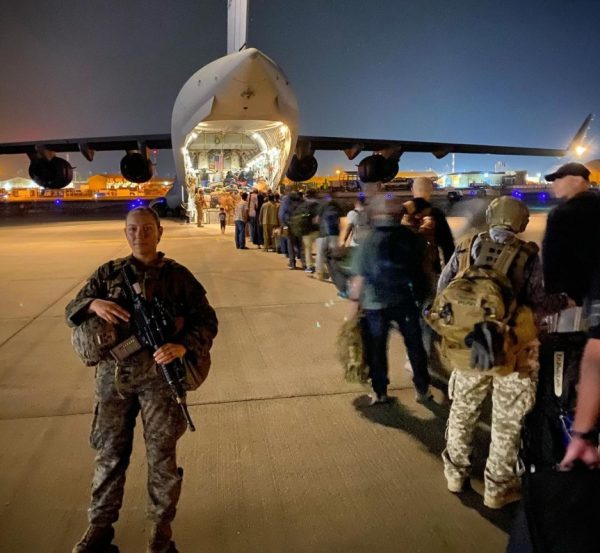 Parler
Parler Gab
Gab
- Ammar Abdulmajid-Mohamed Said, a 19-year-old former Michigan National Guard member, was arrested near a military base in Warren, Michigan, for planning an ISIS-inspired mass shooting. The FBI intercepted his plot, which involved surveillance and weapon procurement.
- Said was discharged from the National Guard in 2024 for failing administrative requirements. Post-discharge, he became radicalized online, expressing support for ISIS and leveraging military training (e.g., firearms proficiency) for his planned attack.
- Said collaborated with undercover FBI agents, conducting reconnaissance (including drone surveillance), securing armor-piercing ammunition and discussing attack logistics. Authorities monitored his actions before arresting him.
- The case highlights ISIS’s persistent influence, following recent attacks and arrests linked to the group. Experts warn of lone-wolf radicalization and gaps in tracking discharged military personnel.
- The incident raises concerns about military vetting, post-service monitoring and counterterrorism efforts. Officials stress the need for improved intelligence-sharing, psychological screening and counter-extremism measures to prevent future threats.
Radical path of a discharged National Guardsman
Said enlisted in the Michigan National Guard in September 2022 but was involuntarily discharged in December 2024 for failing to meet administrative entry requirements. A National Guard spokesperson emphasized the organization’s adherence to “highest professional standards,” yet his failed training — and eventual radicalization — raise concerns over post-service tracking of discharged personnel. According to an affidavit, Said’s disillusionment with the U.S. deepened after his discharge, and he began expressing support for ISIS online, boasting of his military skills, such as grenade handling and rifle proficiency acquired during his service. Despite attempts to vet his surroundings — such as planting an Apple AirTag in an undercover officer’s car in December — the plot advanced as law enforcement allowed it to develop. “ISIS is a brutal terrorist organization which seeks to kill Americans,” stated U.S. Attorney Jerome F. Gorgon Jr. for the Eastern District of Michigan, adding, “We will not tolerate such crimes.”In-depth plotting and undercover takedown
The alleged attack plan involved comprehensive surveillance and coordination. Said flew a drone over the Detroit Arsenal in November 2024, capturing footage to map entry and exit routes, and proposed storing weapons near the base in a commercial storage unit. He provided armor-piercing ammunition and magazines, believing they would arm operatives for a mass-shooting attack. “Operational reconnaissance and surveillance” by Said, coupled with discussions about Molotov cocktails and firearms training, indicated a serious operational focus, prosecutors said. Sue J. Bai, head of the Justice Department’s National Security Division, underscored the risk averted: “We foiled the attack before lives were lost.” If convicted on charges of attempting to provide material support to a foreign terrorist organization and distributing destructive-device information, he faces up to 20 years per count.The threat of ISIS lives on — and adapts
The case follows recent reminders of the Islamic State’s enduring reach. In January, an ISIS flag was found in the trunk of a New Orleans attacker’s vehicle after 14 were killed in that terror attack. Earlier this year, eight individuals detained near the U.S. border with Mexico were linked to ISIS, reigniting fears of cross-border radicalization. Though the U.S. military has severely degraded ISIS territorial control, its ideology persists, inspiring lone actors and small cells worldwide. Brig. Gen. Rhett Cox of Army Counterintelligence Command noted the case’s broader implications: “This arrest is a sobering reminder of the importance of our counterintelligence efforts.” The plot’s use of a former military trainee highlights vulnerabilities in detecting radicalization among discharged personnel and the need for enhanced monitoring of extremist digital activity.Balancing vigilance and trust in national security
As authorities emphasize the success of law enforcement in preventing violence, the Said case remains a cautionary tale. It underscores the tenuous balance between trust in military vetting processes and proactive measures against internal threats. The U.S. must continue investing in intelligence-sharing, psychological screening for recruits and countering extremist narratives. “We will not hesitate to bring the full force of the Department to find and prosecute those who seek to harm our men and women in the military,” Bai said. For now, the Detroit Arsenal stands secure — but the battle against domestic terror will persist. Sources for this article include: 100percentfedup.com Reuter.com KOAT.comIsrael proposes plan to screen Gaza aid recipients using facial recognition technology
By Laura Harris // Share
Federal power grab threatens state sovereignty, privacy as “Big AI” collides with biotech
By Willow Tohi // Share
Raw milk recalled in Northern Ireland following contamination with deadly E. coli strain
By Ramon Tomey // Share
Governments continue to obscure COVID-19 vaccine data amid rising concerns over excess deaths
By patricklewis // Share
Tech giant Microsoft backs EXTINCTION with its support of carbon capture programs
By ramontomeydw // Share
Germany to resume arms exports to Israel despite repeated ceasefire violations
By isabelle // Share










